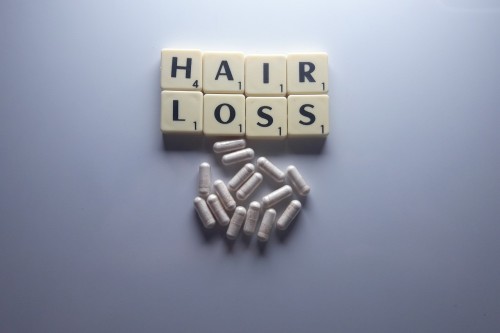Hair Loss - Finding the Root Cause

posted 6th July 2023

Our hair is often our crowning glory and if you are suffering with hair falling out, thinning or have bald patches appearing on your scalp it can be the cause of considerable distress. Research shows that changes in how our hair looks, its texture and thickness can often be a sign of underlying health problems, stress or nutritional deficiencies. But how do we go about finding out what these are and addressing the “root cause”?
Thinning hair due to excessive shedding can often start after a shock to the system and the first stage is to identify this shock or trigger. Stressful situations, hormonal imbalances, infections, medications and viral illness or vaccination can often be this trigger and usually hair loss is resolved after 3-6 months. But sometimes, this hair loss does not resolve and is further driven by metabolic or nutritional shortfalls. Some examples of these are:
- An underactive or autoimmune thyroid - Running a full thyroid blood test panel to check for thyroid antibodies can help identify this. The thyroid can then be supported by the appropriate nutrition and supplement protocol to manage chronic inflammation and bring the immune system back into the appropriate balance.
- Other autoimmune conditions - Chronic inflammation and low vitamin D status are often linked to immune system imbalances which can lead to conditions such as alopecia, lupus and coeliac disease all linked to hair loss. There are genetic and functional tests available which can help identify the potential for autoimmune conditions and test current vitamin D status. Dietary protocols and following an anti-inflammatory diet can then help bring the immune system back into balance.
- Gut issues - Imbalances in the gut microbiome and digestive insufficiencies can lead to poor absorption of nutrients and elimination of toxins. Intestinal permeability or ‘leaky gut’ can often lead to chronic inflammation and autoimmune conditions in other parts of the body. Often improving gut health alone can lead to a significant improvement in both hair and skin health, as well as addressing other conditions such as fatigue, brain fog, anxiety and depression. A functional stool and microbiome test can help identify gut deficiencies and an appropriate nutritional therapy protocol can support imbalances.
- Hormonal imbalances - High and low levels of hormones such as testosterone, progesterone and oestrogen as well as imbalances in cortisol can all drive symptoms of hair loss. Functional tests are available to measure these levels which could be due to ageing in both men and women and/ or medical conditions such as polycystic ovarian syndrome. Identifying hormonal imbalances and supporting them with the appropriate nutrition and lifestyle protocols can be very effective in managing hair loss.
- Nutrient deficiencies - Certain nutrients such as protein, essential fatty acids, vitamins and minerals are key for hair growth and it goes without saying that dietary intake must be rich in these nutrients. However, imbalances within the body in areas such as liver detoxification, energy metabolism and stress can deplete these nutrients and result in a higher need. Supplementation of nutrients in their “active” form may be the key to addressing these imbalances.
If you are interested in finding out more about how Medicinal Eating Nutritional Therapy can help identify “root causes’ of hair loss please feel free to contact me at info@medicinaleating.co.uk or book a free Discovery Call.


